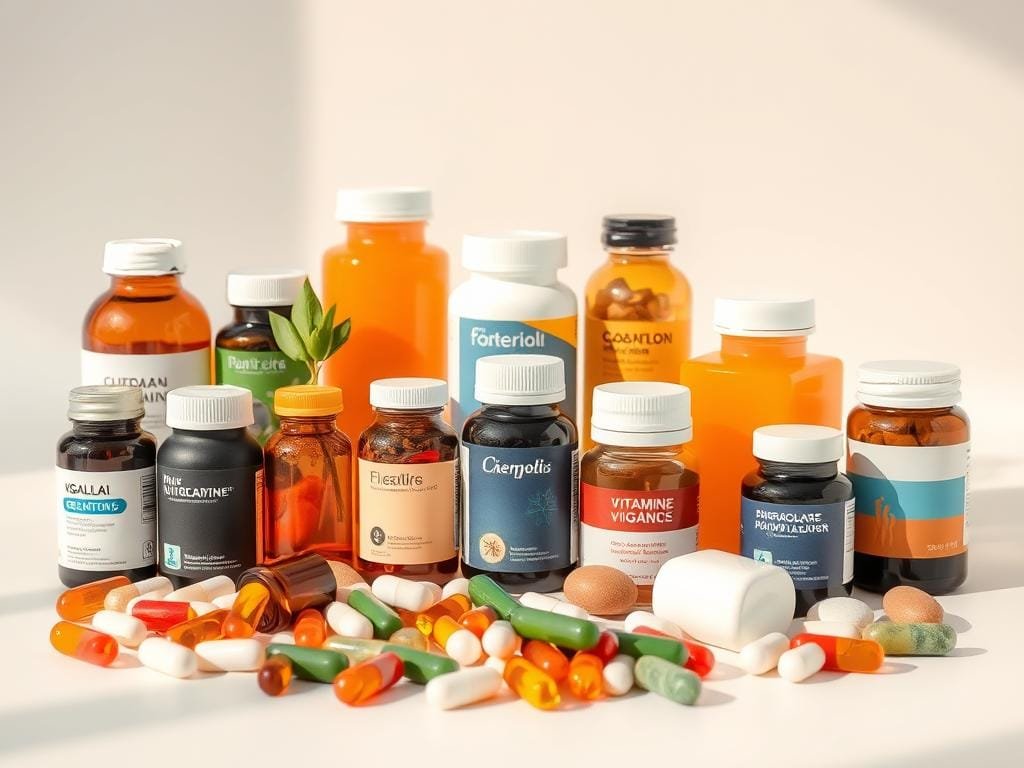Did you know that nearly one in two adults in the United States suffer from a vitamin or mineral deficiency?
Micronutrients are needed in small amounts but are very important for our health. They help with things like metabolism, keeping us healthy, and making our bones strong. Knowing about these micronutrients is key to staying healthy.
Eating a variety of foods and using clean supplements when needed can help. For more information, check out essential nutrients online.
Table of Contents
Key Takeaways
- Micronutrients are vital for our body’s functions like metabolism and immunity.
- Lacking vitamins or minerals can cause problems like anemia or weak bones.
- Eating a variety of foods is essential to get all the micronutrients we need.
- Vitamins and minerals are found in nature but in small amounts.
- Clean supplements can fill the nutritional gap when needed.
The Science Behind Micronutrients and Your Health
Micronutrients are vital for your health. They work alongside macronutrients from food to keep your body running smoothly. Your body can’t make them, so you need to get them from food or supplements.
What Are Micronutrients and Why Your Body Needs Them
Micronutrients include vitamins and minerals. They help with energy, immune function, and healthy tissues. For more on micronutrients, check out Medical News Today.
Your body needs micronutrients for many tasks. They help with metabolism and bone health.
Vitamins are needed in small amounts for energy and immune support. For example, Vitamin C boosts immunity and collagen. Vitamin D is important for bones. Minerals support nerve function and bone health. Getting the right amount is key for wellness.
The Impact of Micronutrient Balance on Overall Wellness
Having the right balance of micronutrients is essential. Too little or too much can cause health problems. A lack of vitamins and minerals weakens your immune system, making you sick easier.
For tips on keeping your micronutrient levels right, even as you get older, visit Boost Healthy Life. They offer advice on vitamins and minerals for those over 40.
Eating a variety of foods is the best way to get micronutrients. But, supplements can also help if your diet is lacking. Knowing about micronutrients helps you make better food choices and live a healthier life.
The Complete A-Z of Vitamins: What You Need to Know
Vitamins are tiny nutrients that help our bodies work right. They help us have energy and keep our immune system strong. Knowing about vitamins can help you eat better and stay healthy.
Vitamin A (Retinol): Vision and Immune Support
Vitamin A, or retinol, is key for good vision, immune health, and skin. It helps our eyes adjust to dark and keeps our skin healthy. It also boosts our immune system by protecting cells from harm.
To get enough Vitamin A, eat sweet potatoes, carrots, dark greens, and liver. This vitamin is important for avoiding night blindness and keeping your immune system strong.

B Vitamins: The Energy and Metabolism Complex
B Vitamins are a group of eight important nutrients (B1-B12). They help us make energy, keep our nerves working, and support our heart. They turn food into energy and help our body’s processes.
Vitamin B12 is key for making red blood cells and keeping our nerves healthy. Find B Vitamins in whole grains, meat, fish, eggs, and dairy. Not getting enough can cause tiredness, weakness, and nerve issues.
If you need more B Vitamins, check out reputable health websites for supplements.
Vitamin C (Ascorbic Acid): Immunity and Collagen Production
Vitamin C, or ascorbic acid, boosts our immune system and helps make collagen. It protects cells and keeps our immune system strong.
Eat foods high in Vitamin C like citrus fruits, strawberries, bell peppers, and broccoli. This vitamin helps prevent scurvy, aids in healing wounds, and boosts health.
Vitamin D: Bone Health and Beyond
Vitamin D is vital for strong bones by helping our body absorb calcium. It also supports our immune system and helps cells grow.
Get Vitamin D from sunlight, fatty fish, fortified dairy, and supplements. It’s important for avoiding bone diseases like osteoporosis and rickets.
In summary, knowing about vitamins and their roles is key to good health. Eating a balanced diet with lots of vitamins helps your body stay healthy and strong.
Essential Minerals: Your Complete Guide
Your body needs essential minerals for many important functions. These minerals help keep you healthy and support your body’s processes, like bone health and energy.
Major Minerals Your Body Requires
Major minerals, or macro minerals, are needed in larger amounts. They are key to your body’s functions. For example, Calcium is important for strong bones and teeth.
Phosphorus helps build bones and teeth and is also involved in energy production. Other major minerals include Magnesium and Potassium. Magnesium is important for muscles and nerves. Potassium helps keep your heart rhythm steady and supports healthy blood pressure.
| Mineral | Primary Functions | Food Sources |
|---|---|---|
| Calcium | Bone health, muscle function | Dairy products, leafy greens |
| Phosphorus | Bone formation, energy production | Meat, fish, eggs, dairy |
| Magnesium | Muscle and nerve function | Nuts, seeds, whole grains |
Trace Minerals: Small Amounts, Big Impact
Trace minerals are needed in smaller amounts but are just as important. Iron is key for making red blood cells. Iodine is needed for thyroid hormone production, which controls metabolism.
Trace minerals like Zinc help with the immune system and healing wounds. Selenium acts as an antioxidant, protecting cells from harm.
For more on supplements and minerals, visit The Truth About Effective Natural Supplements.
Recognizing Vitamin and Mineral Deficiencies
Spotting the signs of vitamin and mineral deficiencies is key to fixing health problems. Your body needs these nutrients to work right. A lack can cause many health issues.

Common Signs of Vitamin Deficiencies
Vitamin deficiencies show up in different ways. For example, not enough Vitamin A can cause night blindness and weak immunity. Vitamin B12 deficiency leads to tiredness, weakness, and brain changes. Not enough Vitamin C means easy bruising, slow healing, and more infections.
Some common signs of vitamin deficiencies include:
- Fatigue and weakness
- Skin problems, such as acne or rashes
- Hair loss
- Poor wound healing
- Increased infections
Mineral Deficiency Warning Signs
Mineral deficiencies are also serious. For instance, Iron deficiency can cause anemia, with symptoms like tiredness, pale skin, and short breath. Not enough Calcium weakens bones and teeth. A Zinc deficiency hurts your immune system and healing.
Some warning signs of mineral deficiencies include:
- Muscle cramps or spasms
- Weakened bones or osteoporosis
- Changes in heart rhythm
- Impaired wound healing
- Hair loss or skin problems
When to Seek Professional Healthcare Advice
If you notice any of these symptoms, see a doctor. They can find out why you’re feeling this way and suggest the right treatment. This could be changing your diet, taking supplements, or more tests.
Don’t wait to get medical help if you think you have a vitamin or mineral deficiency. Catching it early and treating it can greatly improve your health and prevent serious problems.
Optimal Food Sources for Your Daily Vitamin and Mineral Needs
Eating the right foods every day can help you get all the vitamins and minerals you need. A diet full of essential nutrients is key to staying healthy and feeling good.
Vitamin-Rich Foods to Include in Your Diet
To get the vitamins your body needs, eat a variety of foods. Fruits and vegetables are top sources of vitamins. For example, oranges and grapefruits are full of Vitamin C. Leafy greens like spinach and kale are packed with Vitamin K.
Other foods rich in vitamins include:
- Fatty fish like salmon, which is high in Vitamin D
- Nuts and seeds, such as almonds and sunflower seeds, which are good sources of Vitamin E
- Whole grains like brown rice and quinoa, which contain various B vitamins

Mineral-Dense Foods for Complete Nutrition
Minerals are just as important for your health. You can find them in many foods. Dairy products are full of calcium, which is great for your bones. Red meat and fortified cereals are good for iron, which helps your red blood cells.
| Mineral | Food Sources |
|---|---|
| Calcium | Dairy products, leafy greens, fortified plant-based milk |
| Iron | Red meat, poultry, fish, beans, lentils, fortified cereals |
| Zinc | Red meat, poultry, seafood, beans, nuts, seeds |
Seasonal and Local Food Shopping for Nutrient Density
Buying seasonal and local produce boosts your diet’s nutrient density. Produce in season is fresher and more nutritious.
“Eating locally grown produce not only supports local farmers but also ensures that you’re getting the freshest, most nutrient-dense foods available.”
To add more seasonal and local foods to your diet, try:
- Visiting local farmers’ markets
- Joining a community-supported agriculture (CSA) program
- Choosing produce that’s in season in your area
These simple changes can improve your nutrient intake and help your local community.
Smart Supplementation: When and How to Use Vitamin Supplements
Deciding to take vitamin supplements should be based on knowing who needs them and how to pick good products. It’s also important to consider safety. Understanding the benefits and risks helps you make smart choices for your health.
Who Should Consider Vitamin and Mineral Supplements
Some people might need vitamin and mineral supplements because of their diet, health, or lifestyle. For example, vegetarians and vegans might need supplements for vitamins like B12, which is mostly in animal products.
- Pregnant or breastfeeding women often need more folic acid and iron.
- Those on restricted diets, like vegans or those with food allergies, might need supplements.
- People with certain health issues that affect how they absorb nutrients might benefit.
- Older adults might need more calcium and vitamin D for their bones.
Choosing Quality Supplements: What to Look For
When picking vitamin and mineral supplements, choose products from trusted makers. Look for ones tested by third-party groups like NSF International or the National Science Foundation.
| Certification | Description | Benefits |
|---|---|---|
| NSF International | Tests for quality and purity | Ensures the supplement contains what it claims |
| National Science Foundation | Verifies the supplement’s ingredients and manufacturing process | Guarantees a level of quality and safety |
| FDA Registration | Ensures compliance with FDA regulations | Provides an additional layer of safety oversight |

Potential Interactions and Safety Considerations
Vitamin and mineral supplements can be helpful but can also interact with medicines or cause problems if not used right. Always talk to a healthcare professional before starting any supplements, if you’re on medicines or have health issues.
Common Interactions to Be Aware Of:
- Vitamin K supplements can interact with blood thinners like warfarin.
- Calcium supplements can interfere with the absorption of certain antibiotics.
- Iron supplements can cause constipation or interact with medicines for conditions like hypothyroidism.
Finding Reputable Supplement Retailers in Your Area
To get high-quality supplements, buy from trusted retailers. Look for stores or online sites that give clear product info, like ingredient lists and how they’re made.
Being informed and careful helps you use vitamin and mineral supplements wisely. Always talk to a healthcare professional to find the best supplements for you.
Micronutrient Needs Across Different Life Stages
Knowing what nutrients your body needs at each stage of life is key to staying healthy. As you grow older, your body’s need for certain nutrients changes a lot.
Pregnancy and Breastfeeding: Critical Nutrient Periods
When you’re pregnant or breastfeeding, you need more nutrients. This is to keep you healthy and help your baby grow. Folic acid is very important to prevent birth defects. Iron and calcium are also essential for both you and your baby.
Breastfeeding moms need extra nutrients to make milk for their babies. It’s important to get enough Vitamin D and iron.
Children and Adolescents: Supporting Growth and Development
Kids and teens need the right mix of nutrients for their fast growth. Calcium and vitamin D are key for strong bones. Iron helps make healthy red blood cells.
Eating a variety of foods helps meet these needs. Adding rare minerals to their diet can offer extra benefits.
Adults and Seniors: Changing Needs as You Age
As you get older, your nutrient needs change. Adults need a balanced diet to stay healthy. Seniors might need more vitamin B12 because their bodies absorb it less well.
Seniors should focus on getting enough vitamin D and calcium for their bones. Eating lots of fruits, veggies, and whole grains, and taking supplements when needed, is important.
Special Populations: Athletes, Vegetarians, and Medical Conditions
Some groups have special nutrient needs. Athletes need more iron and B vitamins for energy. Vegetarians and vegans should pay extra attention to getting enough vitamin B12 and iron from plants.
People with certain health conditions may need different nutrients. Talking to a healthcare provider about your diet is a good idea.
Maximizing Nutrient Absorption and Bioavailability
To get the most from vitamins and minerals, it’s key to know how to boost their absorption and bioavailability. Nutrient absorption is when your body takes in and uses nutrients from food. Bioavailability is how well your body can use these nutrients.
Food Combinations That Enhance Vitamin Absorption
Some food combinations can really help with vitamin and mineral absorption. For example, vitamin C can help your body take in iron from plant sources. So, eating foods high in vitamin C (like citrus fruits or bell peppers) with iron-rich foods (like beans or spinach) is good. Also, healthy fats like avocado or nuts can help your body absorb fat-soluble vitamins (A, D, E, and K).
Cooking Methods That Preserve Nutrient Content
Cooking methods can greatly affect the nutrients in your food. Steaming is a top choice for veggies because it uses little water and heat. Boiling, on the other hand, can wash away water-soluble vitamins like vitamin C and B vitamins. Grilling or roasting can also be good if done right, helping keep nutrients in food.
Lifestyle Factors Affecting How Your Body Uses Nutrients
Things like stress, smoking, and too much alcohol can hurt how well your body absorbs nutrients. Stress can mess with your digestive system’s ability to absorb nutrients. But, regular exercise and enough sleep can help your body absorb nutrients better and stay healthy.
Connecting with Nutritionists in Your Community
Talking to a nutritionist can give you personalized advice on improving nutrient absorption and bioavailability. They can create a diet plan that fits your nutritional needs and health goals. You can find a nutritionist in your area through professional directories or by asking your healthcare provider for a referral.
Conclusion: Creating Your Personalized Micronutrient Strategy
Now you know a lot about micronutrients. It’s time to make a personalized micronutrient strategy just for you. By adding the right vitamins and minerals to your day, you can boost your health and wellbeing.
Start by eating whole foods for your nutrients. A diet full of fruits, veggies, whole grains, lean proteins, and healthy fats is key. Talk to a healthcare pro or a dietitian to find what’s best for you.
By choosing wisely what you eat and use supplements, you can control your nutrient intake. This leads to a healthy living lifestyle. Remember, knowing about vitamins is just the first step. It’s using this knowledge that really helps you reach your health goals and stay well for life.


